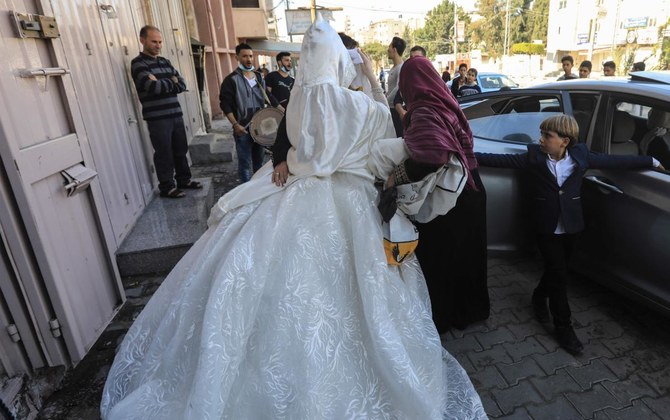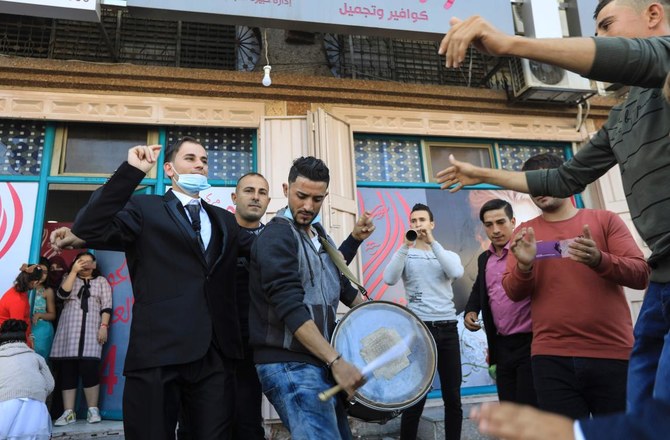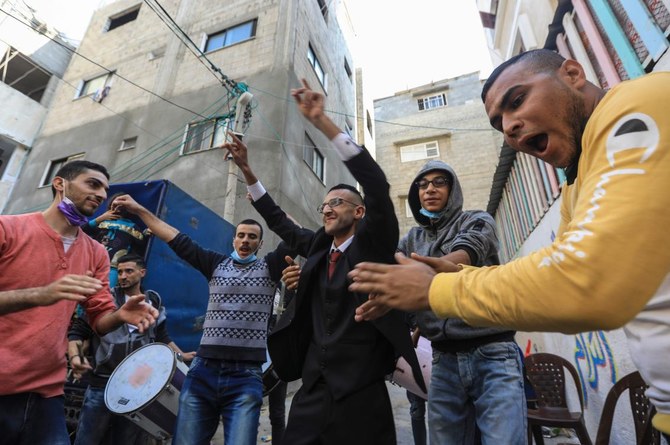GAZA CITY: To the sound of drums and flutes, a freshly coiffed Palestinian groom dances with his brothers, cousins and friends, anxiously waiting for his veiled bride to arrive in her shimmering gown.
It might have been a normal Gaza wedding, except for the venue — not a luxurious seaside hall, but a narrow alley in the Al-Rimal neighborhood of Gaza City.
Welcome to Gaza’s new pandemic-era weddings: they are small because of strict crowd limits, they are held outdoors, and they finish early to beat the curfews.
And they are a whole lot cheaper than usual.
“I’m not entirely happy because I would have preferred to celebrate it in a wedding hall,” said the groom, Mohammed Ahmed Ashour, wearing a blazer and burgundy tie.
But for his family, the 24-year-old merchant told AFP between dances, the pared-down nuptials have also brought welcome savings at a time of economic hardship.
Weddings in the Palestinian coastal enclave are usually extravagant affairs, held in large halls that dot the Mediterranean coastline.
Despite staggering poverty and unemployment rates of around 50 percent even before the pandemic, many Gazans spend several thousand dollars on weddings.
This year the virus has further impacted the economy in the strip, which has been under Israeli blockade since 2007, and is currently spreading rapidly across Gaza.
In recent weeks infections have multiplied and “the situation is getting out of control,” warned Doctor Ahmad Al-Jadba of Gaza City’s Shifa hospital.
On Friday, the Palestinian health ministry announced 922 new cases for the last 24 hours in Gaza, a daily record which takes the total number of people known to have been infected with the virus in the enclave to 18,333, including 86 deaths.
Hamas, the group that runs the strip, has banned large indoor gatherings to contain the spread of coronavirus.
Families have been forced to hold smaller weddings in less-than-fairytale settings — like alleys and backyards — but saved bundles in the process.
Ashour said these days many couples opt for scaled-back daytime nuptials which take “a little over an hour.”
Once the Ashours’ wedding was over, the musicians — three percussionists and a player of the traditional reed flute called a ney — headed home before the evening curfew.
They had more performances booked for the next day, as their small, traveling business is now thriving.
A few days later they were in Jabaliya, a town in the north of the strip, for the wedding of Ahmed Omar Khallah, a 28-year-old postman.
Khallah said that for him, too, the timing is good: “There is no work, no money, but we have saved a lot by marrying now,” he told AFP.
He was picking up his bride from a beauty salon.
Its proprietor, Fadwi, confirmed that “many young couples prefer to get married during the corona period because the costs are lower. They don’t have to rent wedding halls or pay for large buffets.”
Fadwi has changed his business hours to accommodate the new routine as Hamas police patrols enforce the night-time curfews.
“We now start work around 7:00 am,” he said, “because people only get married in ceremonies until 5:00 pm.”
Small is beautiful: Gaza’s toned-down coronavirus-era weddings
https://arab.news/yuxtg
Small is beautiful: Gaza’s toned-down coronavirus-era weddings

- Pandemic-era weddings in Gaza are small because of strict crowd limits and finish early to beat the curfews
- Weddings in the Palestinian coastal enclave are usually extravagant affairs, held in large halls that dot the Mediterranean coastline
Review: ‘Sorry, Baby’ by Eva Victor

- Victor makes a deliberate narrative choice; we never witness the violence of what happens to her character
There is a bravery in “Sorry, Baby” that comes not from what the film shows, but from what it withholds.
Written, directed by, and starring Eva Victor, it is one of the most talked-about indie films of the year, winning the Waldo Salt Screenwriting Award at Sundance and gathering momentum with nominations, including nods at the Golden Globes and Gotham Awards.
The film is both incisive and tender in its exploration of trauma, friendship, and the long, winding road toward healing. It follows Agnes, a young professor of literature trying to pick up the pieces after a disturbing incident in grad school.
Victor makes a deliberate narrative choice; we never witness the violence of what happens to her character. The story centers on Agnes’ perspective in her own words, even as she struggles to name it at various points in the film.
There is a generosity to Victor’s storytelling and a refusal to reduce the narrative to trauma alone. Instead we witness the breadth of human experience, from heartbreak and loneliness to joy and the sustaining power of friendship. These themes are supported by dialogue and camerawork that incorporates silences and stillness as much as the power of words and movement.
The film captures the messy, beautiful ways people care for one another. Supporting performances — particularly by “Mickey 17” actor Naomi Ackie who plays the best friend Lydia — and encounters with strangers and a kitten, reinforce the story’s celebration of solidarity and community.
“Sorry, Baby” reminds us that human resilience is rarely entirely solitary; it is nurtured through acts of care, intimacy and tenderness.
A pivotal scene between Agnes and her friend’s newborn inspires the film’s title. A single, reassuring line gently speaks a pure and simple truth: “I know you’re scared … but you’re OK.”
It is a reminder that in the end, no matter how dark life gets, it goes on, and so does the human capacity to love.

















